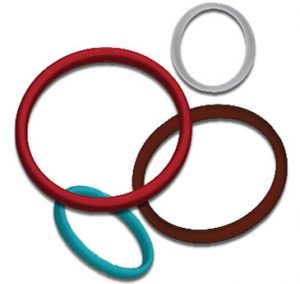
Seals are essential to the operation of many different machines and products. Engines, plumbing systems, furnaces and air conditioning systems all contain seals. Seals, of course, are designed to prevent the leakage of substances like oil or gas. They provide a leak-proof mating surface so that substances can travel within a contained area without leaking. There are different types of seals, however, one of which is vulcanized.
The Basics of Vulcanized Seals
Vulcanized seals are characterized by their production process. They are produced using a hardening method known as vulcanization. You can find O-rings, gaskets and other common types of seals that are produced using vulcanization. Like all seals, these vulcanized seals are designed to prevent substances from leaking.
How Vulcanized Seals Are Made
While there are different ways to produce vulcanized seals, one of the most common methods involves the use of heat and an adhesive. The two ends of a raw rubber seal are pressed together. Heat and adhesive will then bind the two ends together. The end result is a hardened, vulcanized seal.
Benefits of Vulcanized Seals
You might be wondering what benefits vulcanized seals offer. For starters, they are highly resilient. Vulcanized seals can deform when exposed to pressure. When the pressure is relieved, though, they return to their original shape. This makes vulcanized seals an effective solution for preventing leaks. When exposed to a hot substance, for example, vulcanized seals may become larger, thereby strengthening their level of protection against leaks. As the substance cools, the vulcanized seals will become smaller by reverting back to their original shape.
Vulcanized seals are completely resistant to corrosion. They don’t corrode, nor do they rust. Even when exposed to moisture, there’s no risk of corrosion or rusting. Vulcanized seals are made of rubber that’s been exposed to heat and an adhesive. Rubber is protected against corrosion, so vulcanized seals share this same corrosion-proof attribute.
Of course, vulcanized seals are long-lasting. They can last for many years — all while protecting against leaks. Other types of seals may have a shorter lifespan. After expanding and contracting due to thermal exposure, other seals may lose their ability to create a leak-proof mating surface. The end result is substances like oil or gas leaking out of the respective machine.
In Conclusion
Different types of seals are made of different materials. Vulcanized seals are specifically made of vulcanized rubber. They consist of rubber that’s been hardened with heat and an adhesive.
